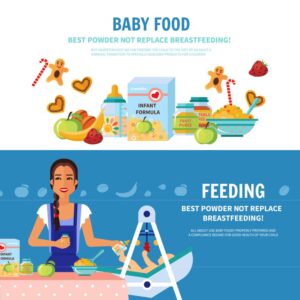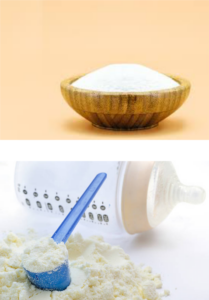Choosing a baby Formula (Dr. Maryum, Dr. Owais Rafiq)
- Dr Owais Rafiq
- September 28, 2023
- 8:52 pm

Selecting the right baby formula for your little one is a significant decision that can have a lasting impact on their health and development. With a wide range of options available on the market, it can be overwhelming for parents to make an informed choice. This blog post aims to provide you with valuable insights and considerations to help you navigate the process of choosing the perfect baby formula.

Choosing the right nutrition for your baby
Here is a comprehensive guide to understanding the nutrients needed by babies and how parents can make informed choices:
| Macronutrients | Significance |
| Carbohydrates | Provide energy and should make up the largest portion of your Baby’s diet. |
| Proteins | Essential for growth and development. |
| Fats | Important for brain development and energy. |
| Vitamin A | Important for vision, immune function, and cell growth. |
| Vitamin D | Essential for bone health. |
| Iron | Critical for cognitive development and oxygen transport. |
| Calcium | Vital for bone and teeth development. |
| Zinc | Required for growth and immune function. |
| Vitamin C | Supports the immune system and iron absorption. |

Consultation with Pediatrician:
Before making any decisions about baby formula, it is crucial to consult with your pediatrician. They can offer personalized advice based on your baby’s specific needs, such as allergies, digestion concerns, or dietary restrictions. Your pediatrician’s guidance is essential in determining the most suitable type of formula for your baby.
Types of Baby Formulas: Ingredients
- Cow’s Milk-Based Formula: Most commonly used and considered a suitable option for healthy babies. These formulas are derived from cow’s milk but have been modified to be more easily digested by infants. They contain essential nutrients like proteins, carbohydrates, fats, vitamins, and minerals.
- Soy-Based Formula: Designed for babies who are allergic to or cannot tolerate cow’s milk. These formulas are plant-based and use soy protein as the primary protein source.
- Hydrolyzed Formula: Also known as hypoallergenic formula, these are recommended for babies with allergies or sensitivities. The proteins in these formulas are broken down into smaller, more easily digestible fragments, reducing the likelihood of an allergic reaction.
- Specialized Formulas: Some infants may require specialized formulas due to specific health conditions. Examples include formulas for premature babies, those with lactose intolerance, or babies with reflux.


Considerations for Choosing Formula:
Allergies and Sensitivities: If there is a family history of allergies or if your baby shows signs of allergic reactions or digestive issues, you may need to consider hypoallergenic or specialized formulas.
Digestibility: opt for formulas that are easily digestible and gentle on your baby’s stomach. Look for options that contain prebiotics or probiotics, which can promote healthy gut flora.
Iron Content: Iron is an essential nutrient for your baby’s growth and development. Choose a formula that is iron-fortified to ensure an adequate intake.
DHA and ARA: These are omega-3 and omega-6 fatty acids that support brain and eye development. Many formulas have these nutrients added, simulating the composition found in breast milk.
Organic Options: If you prefer organic products, look for baby formulas that are certified organic. These formulas are made with ingredients that are free from pesticides, hormones, and antibiotics. Organic: Food is grown without harmful chemicals, pesticides, or genetic modifications. It’s good for the Earth and helps protect animals and plants. Organic farming uses natural methods to keep soil healthy, so kids can enjoy fresh and safe fruits, vegetables, and other yummy treats.
Taste and Texture: Some babies may have preferences for certain formulas in terms of taste and texture. Consider trying small samples or purchasing small quantities initially to see how your baby responds before committing to a larger supply.
Choose the most convenient form: Ready-to-Feed, Powdered, or Concentrated
Baby formulas are available in various forms, including ready-to-feed liquid, powdered, and concentrated liquid forms. Each has its benefits and considerations. Ready-to-feed formulas are convenient but more expensive. Powdered formulas are cost-effective but require preparation. Concentrated formulas are a middle ground, offering convenience and cost-effectiveness.
Transitioning and Monitoring
When transitioning to a new formula, it is essential to monitor your baby’s response closely. Look for any signs of discomfort, allergies, or digestive issues. If you notice any adverse reactions, consult your pediatrician for further guidance.
Conclusion
Choosing the perfect baby formula is a critical decision that requires careful consideration. Consult with your pediatrician, evaluate your baby’s specific needs, and consider factors such as allergies, digestibility, nutrients, and your preferences.
Dr Owais Rafiq
Subscribe to Dr Owais YouTube channel
For parenting advice, child health, symptoms, causes and treatment of illness in children.





